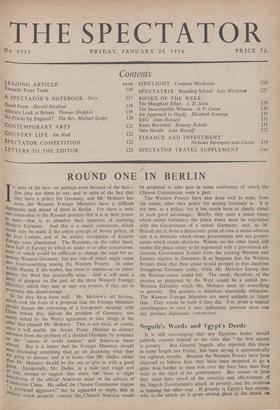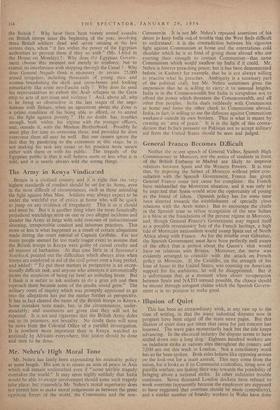Neguib's Words and Egypt's Deeds
It is still encouraging that any Egyptian leader should publicly commit himself to the view that " the first enemy is poverty." But General Neguib, who repeated this thesis at some length last Friday, has been saying it spasmodically for eighteen months. Because the Western Powers have been disposed to believe him, they have been prepared to go a great deal further to meet him over the Suez base than they were in the day of his predecessors. But sooner or later they must have proof of the sincerity and effectiveness of the Neguib Government's attack on poverty, and the evidence is running the other way. If poverty. is Egypt's first enemy, why is the attack on it given second place to the attack on the British ? Why have there been twenty armed assaults' on British troops since the beginning of the year, involving three British soldiers dead and seven missing in the last sixteen days. when " it lies within the power of the Egyptian authorities to prevent them if they so wish " (Mr. Lloyd in the House on Monday) ? Why does th_e. Egyptian Govern- ment choose this moment not merely to reinforce. but to extend, its interference with shipping through the Canal '? Why does General . Neguib think it necessary to review 25.000 armed irregulars: including thousands of young men and women brandishing the skull and cross-bones and looking remarkably like some neo-Fascist rally ? Why does. he send his representatives to exhort the Arab refugees in the Gaza strip to acts of terrarism and violence ? And, above all, why is he being so obstructive in the last stages of the nego- tiations with Britain, when an agreement about the Zone is a prime condition of his being able to afford, or to attend to, the fight against poverty ? He no doubt has troubles enough, both within his regime with the younger. officers, and, outside it, with the Moslem Brotherhood. Possibly he must play for time to overcome these, and provided he does. overcome them all may be well. But one cannot ignore the fact that by pandering to the extremists at this stage, he is not making his task any easier or his position more secure either with them or with his public. The tragedy of the Egyptian public is that it will believe more or less what it is told, and it is nearly always told the wrong things.



















































 Previous page
Previous page